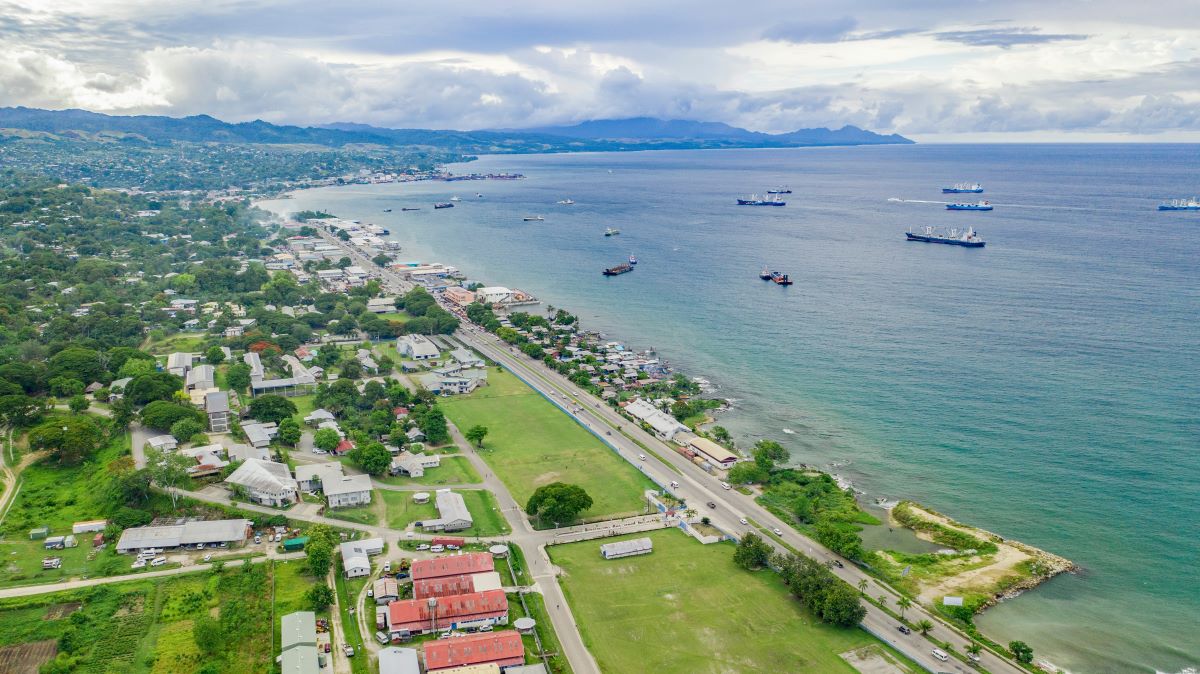The five-year strategy provides a vision and roadmap for the development of e-commerce and the digital economy in the country.
© Gilmore Tana/Shutterstock | Aerial view of the city of Honiara and its port.
The Solomon Islands has developed its first national e-commerce strategy with the support of UNCTAD and other partners.
The country’s policymakers and private sector representatives discussed the potential of e-commerce to create jobs and increase business opportunities for small and medium enterprises (SMEs) at a workshop held on 17 and 18 August in Honiara to finalize the strategy.
“This validation workshop is a major step for the Solomon Islands in its objective to not only advance e-commerce uptake in the country, but also to achieve the goals set out in its National Development Strategy 2016-2035 by generating economic activity and innovation across sectors and industries,” said Shamika N. Sirimanne, UNCTAD’s director of technology and logistics.
More than 80 participants from across the country’s government, the private sector and civil society provided feedback on the strategy to ensure that it will benefit all Solomon Islanders.
After the government endorses and adopts the strategy, its implementation will begin, running from 2022 to 2027.
“This is an exciting time for digital development in the Solomon Islands. As the government moves towards strategy implementation, UNCTAD and other development partners stand ready to assist. It’s only through collaboration and partnerships that e-commerce will truly emerge and flourish,” said Dominic Leong, UNCTAD’s regional specialist on e-commerce and the digital economy.
E-commerce remains limited
Despite high mobile phone usage and growing access to the internet, online commerce remains limited in the Solomon Islands.
“The national e-commerce strategy includes a practical set of activities to improve the business, policy and regulatory environment for the development of e-commerce and the broader digital economy in Solomon Islands,” said Riley Mesepitu, permanent secretary of the Ministry of Commerce, Industry, Labour and Immigration.
“We believe in the power of online commerce to improve the lives of all Solomon Islanders. Online commerce and the digital economy can create jobs, raise incomes and drive innovation.”
In other countries in the region, e-commerce has accelerated economic development and opened access to new domestic, regional and international markets for businesses of all sizes.
In Fiji, for example, e-commerce is providing meaningful jobs to women in rural villages, who sell their handmade products to online customers in Fiji, Australia, New Zealand, the United States and beyond.
“This is the power of e-commerce. It allows SMEs to access new markets. It brings rural and urban markets closer together. It reduces business transaction costs and makes it easier to start and operate a new business,” said Moses Virovolomo, permanent secretary of the Ministry of Communication and Aviation.
“We must embrace e-commerce and the digital economy to support all Solomon Islanders, including our youth, women and those living in rural areas.”
A joint initiative
The strategy was developed with the support of the Pacific Digital Economy Programme, a joint initiative of UNCTAD, the United Nations Capital Development Fund and the United Nations Development Programme. Its inception phase is funded by Australia.
“As more Solomon Islanders develop online businesses, this is absolutely the right time for the national e-commerce strategy. Australia is proud to support its development. People who have smart ideas can get good things done if they have three things: the right tools, a level playing field and a conducive, enabling environment. This strategy is part of that mix,” said Lachlan Strahan, Australian High Commissioner for the Solomon Islands.

